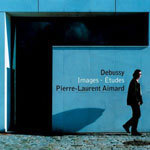
Debussy: Images / Etudes
 $25.00
Special Order
$25.00
Special Order3 - 6 weeks add to cart
CLAUDE DEBUSSY
Debussy: Images / Etudes
Pierre-Laurent Aimard (piano)
[ Warner Classics / CD ]
Release Date: Friday 13 February 2004
This item is only available to us via Special Order. We should be able to get it to you in 3 - 6 weeks from when you order it.
"Hugely impressive Debussy performances, making him still sound modern today"
Editor's Choice Gramophone magazine (Nov 2003)
Editor's Choice Gramophone magazine (Nov 2003)
"Debussy once remarked that he would like to get rid of the initial percussive attack of the piano's hammers on the strings. He is said to have regarded the piano as Balinese musicians regard their gamelan orchestras, interested not so much in the single tone heard when a note was struck as in the patterns of resonance which that tone set up. Many of his pieces are built entirely on this acoustical sense of the piano, and the radical nature of his piano writing is something I actively enjoy when it's idiomatically played. With Pierre-Laurent Aimard the sheer freshness and novelty of it come across strongly. So does the ardour. Whereas some players are content with mood and atmosphere, his communication of feeling is acute - which is just as it should be. He gives full value to Debussy's fierceness; there are passages of extraordinary violence in this music, especially in the Etudes. Aimard makes them sound still modern today; I shall not be alone in finding a greeting from Ligeti to Debussy at the beginning of Pour les sixtes.
Reactions to Debussy playing are perhaps more personal than to many composers. I like Aimard a lot; for some, I dare say, there will be not enough velvet. He has a fine ear for sound but others would favour letting sonorities hang longer in the air. You could not ask him for more colour, or greater sensibility, but he is not a charmer. He has edge and likes sonority to work directly and precisely to the business in hand. He goes always for the movement and the thrust of what's written, and I guess that people used to a more spacious and laid-back view of the Images, in particular, may occasionally be disconcerted; the closely balanced recording might accentuate their impression.
There is transparency, above all, which is an ideal commodity in 'Mouvement', but in 'Hommage à Rameau' I would have welcomed the occasional 'dissolve' between the planes of sound, in place of some chunkiness; and in 'Reflets dans l'eau' and 'Poissons d'or' there is sometimes too much daylight in the sonority, a tad too much finger, or hammer, in the production. And Aimard is not one to hang about; these are hyperactive goldfish, as if a prohibited substance had perhaps been added to their food. Pretty wonderful playing nevertheless, if not as elastic in getting from one thing to another as that of some other great Debussyans. Nor perhaps quite as generous in character overall.
Longer acquaintance may modify some of my reactions, but there is nothing tentative about my general, initial one: it is a Debussy record of high class, hugely stimulating, refreshing as spring rain, and Aimard's version of the 12 Etudes is up there with the very best. That means with Uchida's of 1989; Aimard's in no way supplants or overtakes hers but makes another benchmark recording, one for modern times, different but equally invigorating. She is the more interesting personality; though Aimard is an important player in full evolution and who can predict what he may go on to achieve? Technically, he is a wizard, without a chink in his armour; you could sample the group of Etudes comprising 'Pour les huit doigts', 'Pour les degrés chromatiques' and 'Pour les notes répetées' for a feel of his quality. But he is the best kind of technician, playing like a composer, and letting the music drive him."
(Gramophone)

